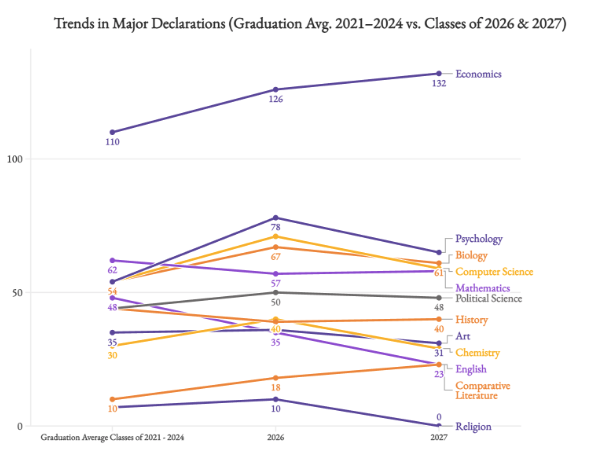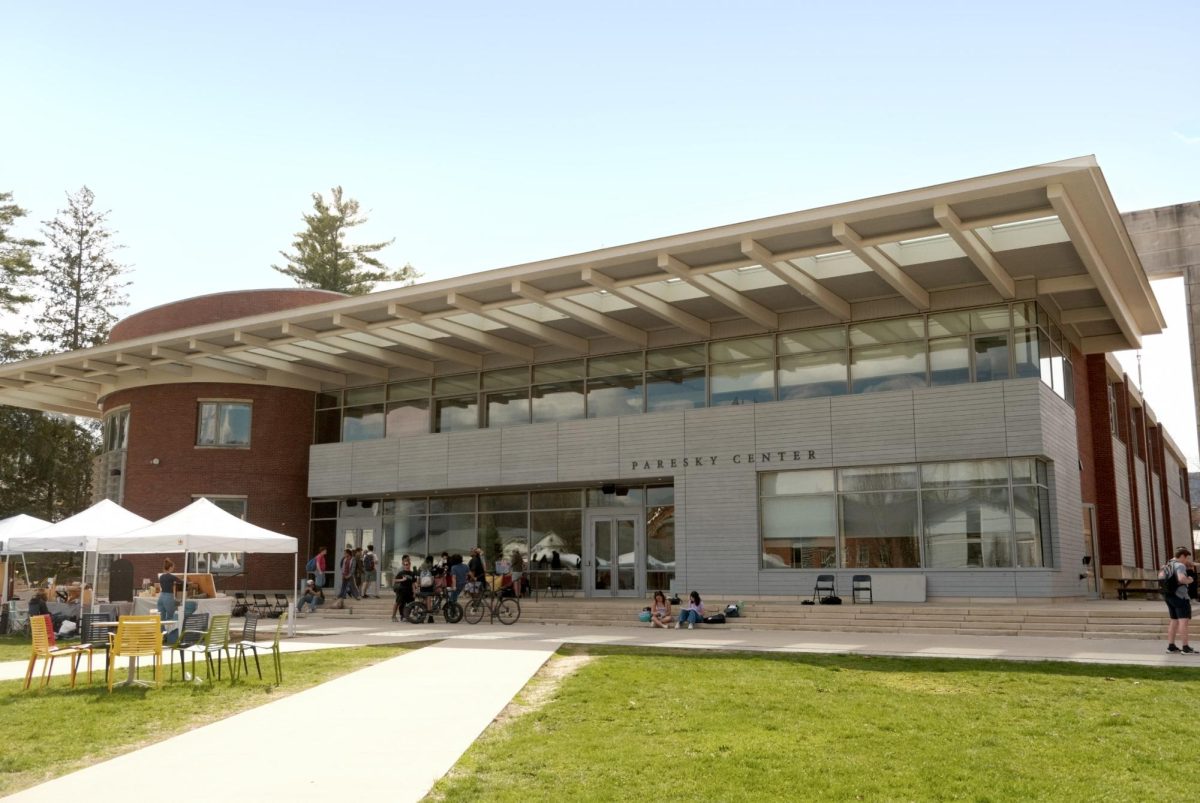
This semester, 23 sophomores declared an English major, a sharp drop from last year’s 35 declarations. In 2023, the department had 42 graduating seniors, a near-40 year low, according to data from the Registrar’s office.
Meanwhile, 23 students declared a major in comparative literature — up from 18 last year and more than double the department’s 2021-2024 four-year average of 13 graduating majors. No sophomores declared a religion major, down from 10 who declared last year and the four-year graduation average of seven. Unless any students add the major before graduating, the class of 2027 will be the first not to include a religion major since 1986, the first year of publicly available data from the Registrar’s Office.
The divisional distribution of majors followed the same overall pattern as last year — Division 3 led with 330 declarations, followed by Division 2 with 307 and Division 1 with 144. The most-declared majors this year were economics, which received 132 declarations, psychology with 65, biology with 61, computer science with 59, and mathematics with 58.
With its sharp rise in declarations, comparative literature entered the top ten most popular majors for the first time since the major’s establishment in 2002.
Aarju Poudel ’27, who declared the comparative literature major instead of the English major, said that her decision was influenced partially by the number of requirements to fulfill a major in the respective departments. “Comparative literature felt a lot more flexible,” she said in an interview with the Record. “The English major requires a number of specific courses across defined categories, whereas comp lit gives me more room to explore interdisciplinary interests and feels less centered on a traditionally Eurocentric canon.”
In a statement to the Record, Chair and Professor of Comparative Literature Sarah Allen said she was excited about students’ increased interest in the department. “Comp Lit is thrilled to see this robust interest,” Allen wrote. “Major numbers do often fluctuate a fair amount from year to year, but overall, comp lit has been on an upward trajectory in recent years. We think the most important factor is that Williams students have a real hunger for literature, and they find great value in reading, thinking about, and talking about literary texts with faculty and with their fellow students.”
“It also seems that there’s more awareness of comparative literature as a field on campus than there used to be — students realize that some of the ‘English’ classes they loved in high school were really ‘literature’ classes, in which they may have read a variety of different works from all over the world,” she added. “It is also true that the comp lit major has a lot of flexibility. We think of this as a key component of the liberal arts — our students have the freedom within the major to largely chart their own intellectual journey.”
Professor of Comparative Literature Christopher Bolton, who will chair the department in the fall, echoed Allen’s sentiments. “I think students appreciate… the many different paths they can take through the program,” he wrote in an email to the Record. He also noted a handful of recent changes within the department, like replacing the traditional senior seminar with a senior portfolio, and expanding the kinds of media covered in its classes.
In an email to the Record, Chair and Professor of English Gage McWeeny, wrote that he does not view the departments as being in competition with each other. “The enrollments across the units reflect the vibrancy, breadth, and strength of the study of literature at Williams,” he wrote. “It’s probably worth knowing that English courses constitute a sizable share of comparative literature’s course offerings, typically around 25 percent. So, the distinctions at the level of course offerings are not [as] hard and fast as they might appear.”
Austina Xu ’27, who declared an English major, told the Record, “I tried to let interest be the determining factor for me, and after looking through the course catalogs for both, I found myself naturally gravitating towards the English major more,” she said. “I think the English major is still a really flexible major generally speaking. And the requirements push us to engage with literature I might have initially ruled out, but then end up really liking.”
McWeeny attributed the decrease in major declarations to structural constraints rather than a loss of interest. “English is in a bit of a rebuilding phase. We have lost 40 percent of our faculty over the last several years, largely to retirements,” he wrote. “So, we have necessarily been able to offer a little less variety and depth in some areas of the curriculum, along with fewer overall courses.”
McWeeny also expressed optimism about the future of the program. “We are now entering a new phase of expanding the faculty and curriculum in English, with three new faculty on the way,” he said. Among them is fiction writer Paul Yoon, joining in Fall 2025, alongside two forthcoming hires to be selected in national searches next year. “As we rebuild, these hires will enable us to offer terrific courses in compelling areas of the study of literature, history, and culture.”
Professor of English Shawn Rosenheim said that whether these changes in English enrollment reflect temporary fluctuations or longer-term patterns remains to be seen. “We’d need several years of data to know if we’re looking at a blip or a pattern,” he noted.
Like religion, astronomy received no declarations. Despite one student declaring astronomy last year, the average number of graduating astronomy majors for the past four years is zero.
This year, four students declared a contract major, two in Division 1 and two in Division 2. Last year, two students declared contract majors, pursuing individualized programs of study not represented by existing departmental offerings.
53 percent of juniors declared more than one major this year, matching the percentage from last year.
Correction: A previous version of this article incorrectly stated that no members of the class of 2027 declared contract majors this year. The article was updated on May 14 at 9:07 a.m. to reflect this error.














